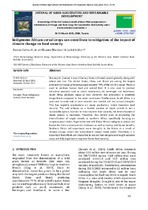| dc.description.abstract | Zea mays L. (maize) is one of the top three cultivated cereals globally, along with
wheat and rice. The United States, China, and Brazil are among the largest
producers of maize, producing approximately 79% of the world’s maize. Maize is
used to produce human food and animal feed. It is also used to produce
industrial products such as starch sweeteners, oil, beverages and bioethanol.
South Africa produces maize as well. However, this production is relatively
insignificant compared to the major producers. Furthermore, South Africa is a
semi-arid country and as such receives less rainfall and has annual droughts.
This has negative implications on maize production, which threatens food
security. The sole reliance on a limited number of staple cereals is not a
sustainable option. In order to truly improve food security, the diversification of
staple cereals is necessary. Therefore, this review aims at discussing the
diversification of staple cereals in southern Africa, specifically focusing on
sorghum, pearl millet, finger millet and teff. These African indigenous cereals are
known for their environmental resilience as well as having nutritional benefits.
Southern Africa will experience more droughts in the future as a result of
climate change, which will undoubtedly impact maize yields. Therefore, it is
important that efforts are intensified to ensure that indigenous drought-adapted
crops are fully exploited to improve future food security. | en_US |

